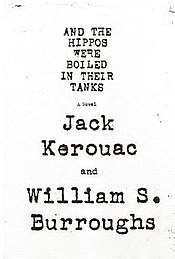|
And the Hippos Were Boiled in Their Tanks
And the Hippos Were Boiled in Their Tanks is a novel by Jack Kerouac and William S. Burroughs. It was written in 1945, a full decade before the two authors became famous as leading figures of the Beat Generation, and remained unpublished in complete form until 2008. CreationThe book consists of alternating chapters by each author writing as a different character. Burroughs (as William Lee, the pseudonym he would later use for his first published book, Junkie) writes the character "Will Dennison" while Kerouac (as "John Kerouac"), takes on the character of "Mike Ryko".[1] According to the book The Beat Generation in New York by Bill Morgan, the novel was based upon the killing of David Kammerer who was obsessed with Lucien Carr. Carr stabbed Kammerer to death in a drunken fight, in self-defense by some accounts, then dumped Kammerer's body into the Hudson River. Carr later confessed the crime, first to Burroughs, then to Kerouac, neither of whom reported it to the police. When Carr eventually turned himself in, Burroughs and Kerouac were arrested as accessories after the fact. Kerouac served some jail time because his father refused to bail him out but Burroughs was bailed out by his family. (Kerouac married Edie Parker while in jail, and she then paid his bail.)[2] TitleThe book's title allegedly comes from a news broadcast, heard by Burroughs, about a fire at a circus during which the announcer broke into hysterics on reading the line.
In a 1967 interview for The Paris Review, Kerouac agreed with the basis of the story but said the fire was at London Zoo.[3] However, in his afterword to the 2008 publication, James Grauerholz indicated that the origin of the title is unconfirmed and may have been related to a zoo incident in Egypt, or possibly a fire that occurred at a circus.[3] CharactersKerouac often based his fictional characters on friends and family.[4][5]
Publication and receptionIn later years, Burroughs did not consider And the Hippos Were Boiled in Their Tanks worth retrieving from obscurity. In the 1986 documentary What Happened to Kerouac? he dismissed it as "not a distinguished work."
According to James Grauerholz, numerous attempts were made by Kerouac and others to get the book published, until Burroughs brought a lawsuit over the use of quotations from the manuscript that appeared in New York magazine in 1976; the suit, which was settled in the 1980s, established the ownership of the work.[8] When Burroughs died in 1997, Grauerholz became the executor of his estate, with responsibility for the disposition of his unpublished works. He had befriended Lucien Carr and agreed not to publish the manuscript in Carr's lifetime, although an excerpt from the book was included in the 1997 Burroughs omnibus Word Virus, published by Grove after the writer's death (but approved by Burroughs before he died). Carr's death in 2005 made way for the complete book to be published at last.[9] Penguin Books published the novel in November 2008.[10] An American edition was published by Grove Press. Ian Pindar, writing for The Guardian, agreed with Burroughs' assessment about the book but said "Neither Burroughs nor Kerouac is at his best here, but Hippos has value as a testament to their latent talent."[7] The New York Times, in a review panning the novel, called the book "flimsy" "repetitious" and "flat-footed".[11] The review said "The best thing about this collaboration between Jack Kerouac and William S. Burroughs is its gruesomely comic title".[11] A positive review in The Independent stated that the "novel has limited claims to the literary high ground, but is an enjoyable read".[12] Although not based upon the novel, the 2013 film release Kill Your Darlings re-creates the events leading up to the murder that inspired the book. References
External links
|
||||||||||||||||||||||||||||||||||||||||||||||||||||||||
